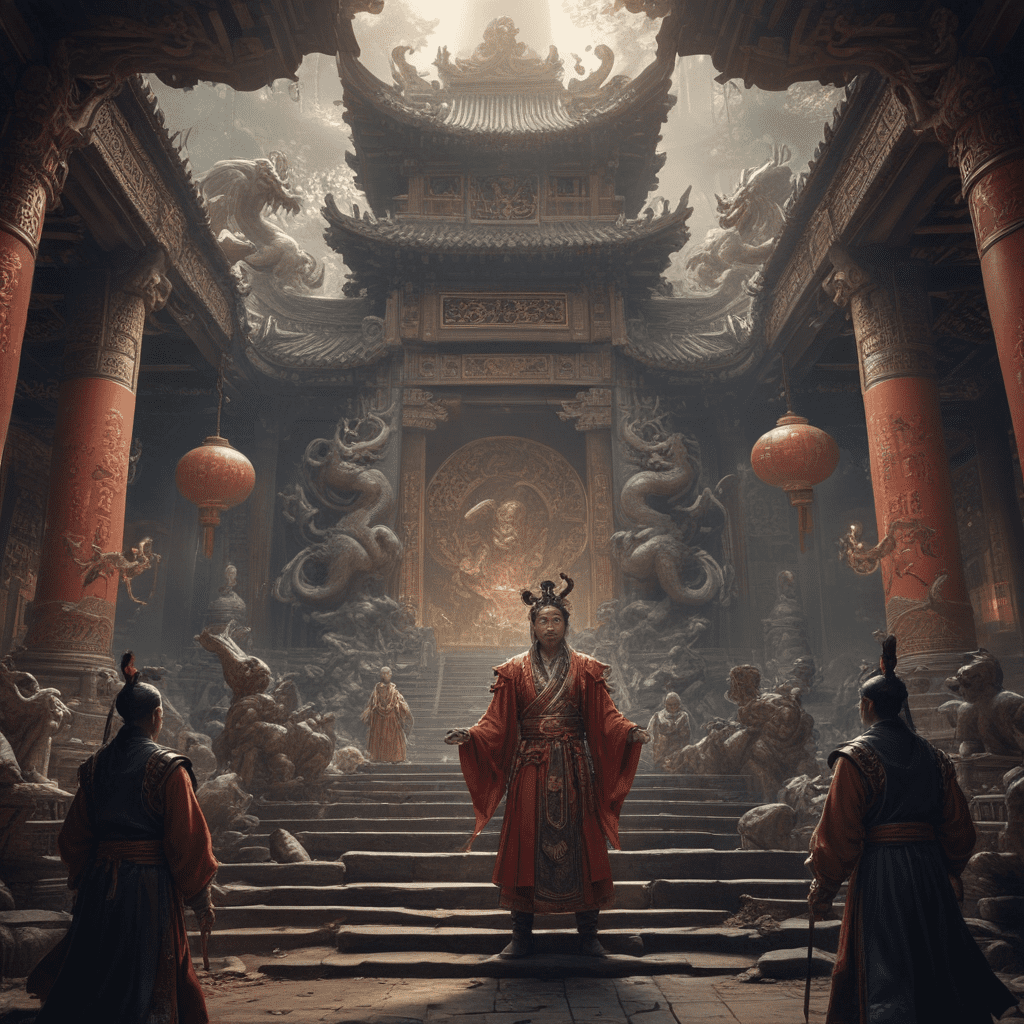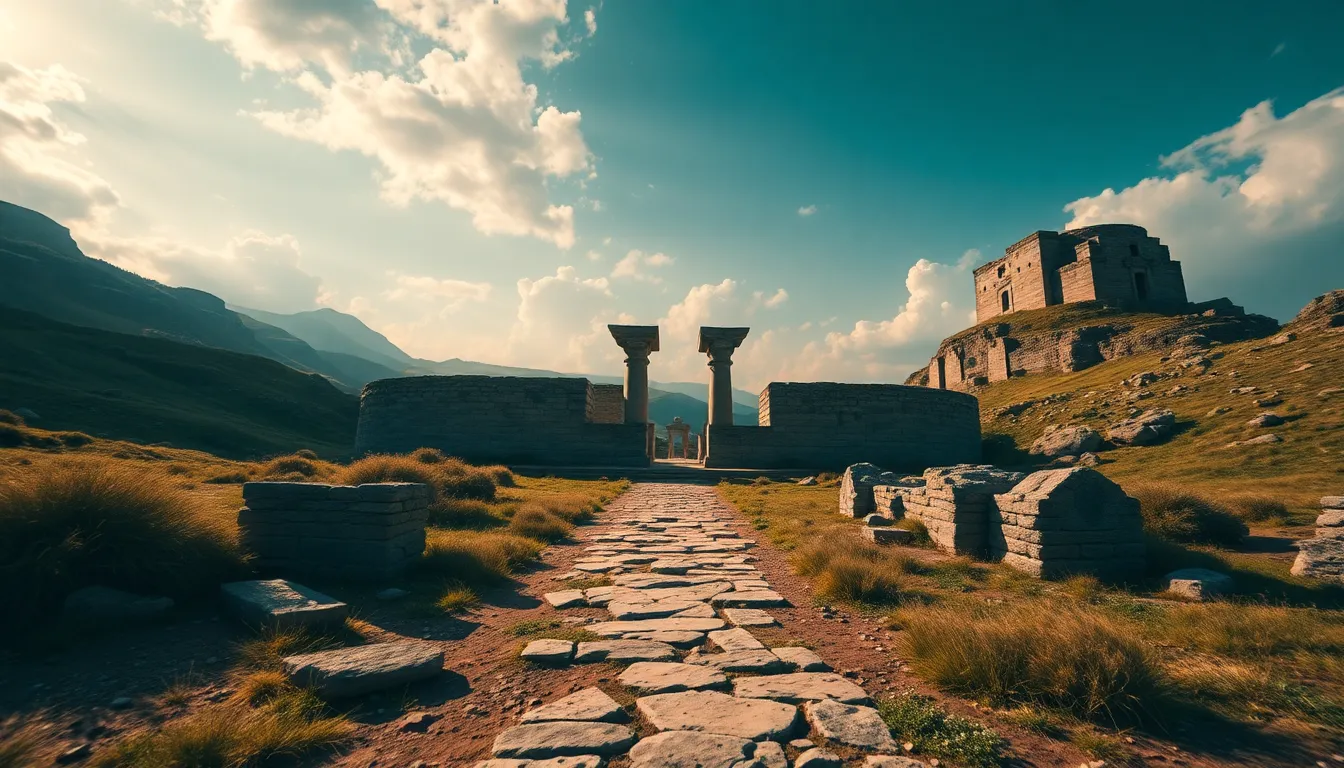Chinese Mythological Underworld: Diyu and Its Rulers
I. Introduction
In the realm of Chinese mythology, Diyu stands as the enigmatic and expansive underworld. Envisioned as a subterranean labyrinth of intricate chambers and treacherous landscapes, Diyu serves as the abode for departed souls and a stage for their judgment and retribution. This multifaceted underworld is governed by a hierarchy of rulers who preside over the numerous courts of Diyu, each administering a specific aspect of the afterlife.
II. The Concept and Structure of Diyu
Diyu, often referred to as Hell or Purgatory, is a multi-layered underworld divided into ten primary courts, each presided over by a distinct ruler. These courts are interconnected by perilous paths and formidable gates, creating a vast and complex hierarchy. The severity of punishment and the duration of stay within each court vary significantly, reflecting the karmic deeds accumulated by the deceased during their mortal lives.
III. The Ten Courts of Diyu
The ten courts of Diyu, each with its unique characteristics and responsibilities, form the core structure of the Chinese mythological underworld. These courts mete out justice to the departed, assessing their actions and determining their subsequent fate. The rulers of these courts possess immense power, wielding authority over the souls that pass through their domains.
IV. Yanluo Wang: The Lord of Diyu
Yanluo Wang, also known as Yama or King Yama, reigns supreme as the sovereign of Diyu. A revered and formidable figure, he presides over the first court and is responsible for adjudicating the initial judgment of the deceased. Yanluo Wang is depicted as a majestic figure, adorned in elaborate robes and wielding a formidable scepter. His impenetrable gaze and unwavering demeanor instill both awe and trepidation among those who enter his court.
V. Qin Guang Wang: Ruler of the First Court
Qin Guang Wang, the benevolent ruler of the first court, is charged with the critical task of assessing the merits and sins of the deceased. He carefully examines their records and determines their subsequent journey through Diyu. Qin Guang Wang is renowned for his compassion and fairness, offering guidance and support to those who seek redemption. His presence within the first court provides a glimmer of hope amidst the otherwise formidable landscape of Diyu.
VI. Chu Jiang Wang: Ruler of the Fifth Court
Chu Jiang Wang presides over the fifth court of Diyu, a realm reserved for souls who have committed heinous crimes and atrocities. He is depicted as a fearsome figure, his countenance contorted in wrath. Chu Jiang Wang metes out severe punishments, condemning the wicked to tortures that reflect the gravity of their transgressions. His court serves as a stark reminder of the consequences of evil and the unwavering justice of Diyu.
VII. Song Di Wang: Ruler of the Tenth Court
Song Di Wang reigns over the tenth and final court of Diyu, a realm where souls have the opportunity for redemption and rebirth. He is known for his benevolence and compassion, offering guidance and support to those who seek to atone for their past sins. Song Di Wang's court represents the hope for renewal and the transformative power of the afterlife.
VIII. Other Notable Rulers in Diyu
Beyond the ten primary courts, Diyu is home to numerous other notable rulers, each with their unique domain and responsibilities. These rulers include:
Bi An Wang: The king of ghosts, responsible for maintaining order among the restless spirits that roam Diyu.
Dushi Erlang Shen: A powerful deity known for his bravery and ability to subdue demons.
Meng Po: The goddess who offers a potion of forgetfulness to souls before they reincarnate, ensuring they have no memory of their past lives.
IX. The Role of Demons and Ghosts in Diyu
Diyu is not solely inhabited by the souls of the deceased. It is also a realm where demons and ghosts roam freely. These supernatural beings play a significant role in the underworld, often serving as tormentors or guardians. Demons inflict punishments upon the wicked, while benevolent ghosts offer assistance to those who seek redemption. The presence of these otherworldly entities adds an element of complexity and intrigue to the mythology of Diyu.
X. The Cycle of Rebirth and the Influence of Karma
The Chinese mythological underworld is deeply intertwined with the concept of reincarnation. After completing their journey through Diyu, souls are reborn into the mortal realm, carrying with them the karmic consequences of their past actions. Good deeds lead to favorable rebirths, while negative actions result in unfavorable ones. This cycle of rebirth and the influence of karma serve as a moral compass, guiding individuals to strive for righteousness and avoid evil.
Frequently Asked Questions
1. What is the significance of Diyu in Chinese mythology?
Diyu is the underworld in Chinese mythology, where souls are judged for their actions and punished or rewarded accordingly. It serves as a reflection of the moral and ethical principles of ancient Chinese society.
2. Who are the main rulers of Diyu?
Yanluo Wang, Qin Guang Wang, Chu Jiang Wang, and Song Di Wang are the primary rulers of Diyu, each presiding over different courts and administering specific aspects of the afterlife.
3. What types of punishments are inflicted in Diyu?
Punishments in Diyu vary depending on the severity of one's sins and can include boiling in oil, freezing in ice, or being torn apart by wild beasts.
4. Is there any hope for redemption in Diyu?
Yes, the tenth court of Diyu, ruled by Song Di Wang, offers souls the opportunity for redemption and rebirth. By atoning for their past sins, souls can escape Diyu and achieve a better afterlife.
5. What is the significance of demons and ghosts in Diyu?
Demons and ghosts play a significant role in Diyu, often acting as tormentors or guardians. They add an element of complexity and intrigue to the mythology of the underworld.



